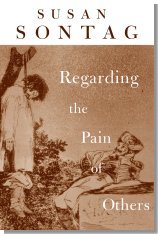Susan Sontag played
an important role in recent US cultural and political history, and her
work was widely admired world-wide. She passed away on 27 December 2004,
after a long struggle with cancer. An obituary and several recent commentaries
follow.
Susan
Sontag, Social Critic With Verve
By MARGALIT FOX
December 28, 2004, New York Times
"Susan Sontag, the novelist, essayist and critic whose impassioned
advocacy of the avant-garde and equally impassioned political pronouncements
made her one of the most lionized presences - and one of the most polarizing
- in 20th-century letters, died yesterday morning in Manhattan. She
was 71 and lived in Manhattan..."
Visit Susan
Sontag's website
Sontag
and Tsunami
By Rebecca Solnit
Published on Monday, January 3, 2005 by TomDispatch.com
"The news of Susan Sontag's death arrived as a single sentence
spoken in the opening moments of a radio news program Tuesday morning,
and then the program returned to what had been the main story since
the day after Christmas: the tsunami and the death toll, then in the
tens of thousands, that would continue to rise. It was strange to
weigh these two incidents of mortality against each other. Though
for some people it would be considered insensitive or irreverent even
to do so, one of the things to be appreciated about Sontag, I think,
is that she considered everything a proper occasion for more thinking,
more analyzing, more writing..."
Regarding
the Torture of Others: Susan Sontag's powerful critique of
U.S. torture in Iraq
"Shock and awe were what our military promised the Iraqis.
And shock and the awful are what these photographs announce to the
world that the Americans have delivered: a pattern of criminal behavior
in open contempt of international humanitarian conventions. Soldiers
now pose, thumbs up, before the atrocities they commit, and send off
the pictures to their buddies. Secrets of private life that, formerly,
you would have given nearly anything to conceal, you now clamor to
be invited on a television show to reveal. What is illustrated by
these photographs is as much the culture of shamelessness as the reigning
admiration for unapologetic brutality.
The notion that
apologies or professions of ''disgust'' by the president and the secretary
of defense are a sufficient response is an insult to one's historical
and moral sense. The torture of prisoners is not an aberration. It
is a direct consequence of the with-us-or-against-us doctrines of
world struggle with which the Bush administration has sought to change,
change radically, the international stance of the United States and
to recast many domestic institutions and prerogatives."...
 |
Published
by Farrar, Straus & Giroux February 2003 hardcover, 240 pages
$23.00US/$37.00CAN ISBN: 0-374-24858-3
Read
an excerpt
"Sontag,
one of our most perceptive and valiant thinkers, offered a seminal
critique of camera-mediated images in On Photography. Now, 25
years later, photographs and video of the bloody consequences
of terrorism and war routinely fill the media, and Sontag offers
a fresh, meticulous, and deeply affecting dissection of the
role images of suffering play in our lives . . . Writing with
electrifying clarity and conciseness, Sontag . . . [is] scrupulous
in her reasoning and exhilarating in her arguments." --Donna
Seaman, Booklist
|
Finding
fact from fiction
Guardian Interview
with Susan Sontag
May 27, 2000 The Guardian
|

